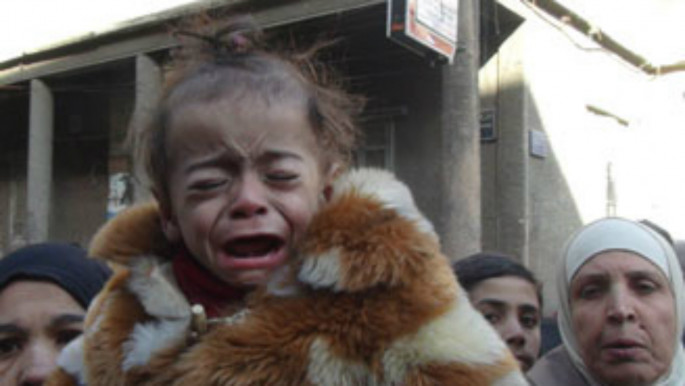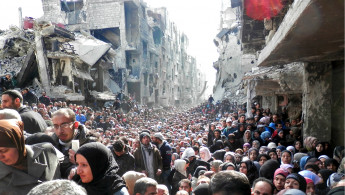Voices from Yarmouk
Established in 1957 to accommodate refugees who were scattering in mosques, schools and other public places, Yarmouk camp, once a thriving neighbourhood, is home to the largest Palestine refugee community in Syria, also housing some 650,000 Syrians.
Located 8km from the centre of Damascus, Yarmouk resembles an urban quarter and looks very different to other Palestine refugee concentrations in Syria.
Over the years, refugees improved their shelters and added more rooms to them. But today, the camp is crowded with cement block homes and is densely populated.
"Most houses have no doors or windows, and in the snow storm life became harder. There is no wood, we are burning furniture and clothes to keep warm" explained Raed'a who lives in the camp.
As if the plight of Palestinians and Syrians was not already enough, the camp has been under government siege for nearly two years and has witnessed several rounds of ferocious and deadly fighting between government forces and militants.
Most of the camp's inhabitants fled in late 2012 as clashes erupted between pro- and anti-Assad Palestinian gunmen - many to overcrowded and destitute Palestinian refugee camps in neighbouring Lebanon. Only the poorest remained behind.
On Monday UN official, Chris Gunness, described the situation as "beyond inhumane" adding that the agency has not been able to send any food nor any convoys into the camp since the fighting started.
"The situation in Yarmouk is an affront to all of us, a source of universal shame," Gunness said.
Many warn of a looming humanitarian catastrophe in the camp.
 |
|
| Children of Yarmouk, Rami Al-Sayyed for unrwa.org |
"Yarmouk had already been besieged by the regime’s forces but now residents are now trapped inside their homes as IS fighters and snipers take positions around them, aided by the regime’s air strikes” an activist, speaking on conditions of anonymity, told al-Araby al-Jadeed.
"Because of the siege and this fighting, most residents have run out of water or food. If this continues, it will lead to a humanitarian crisis" he added.
Prior to the Syrian civil war, Yarmouk had more than 150,000 refugees. Now, the United Nations says around 18,000 civilians, including a large number of children, are trapped inside the camp, with inadequate access to food supplies, clean water and electricity.
"To know what it is like in Yarmouk, turn off your electricity, water, heating, eat once a day, live in the dark, live by burning wood," Anas, a Yarmouk resident said.
 |
To know what it is like in Yarmouk, turn off your electricity, water, heating, eat once a day, live in the dark, live by burning wood |  |
The United Nations Relief and Works Agency (UNRWA) says it needs to distribute at least 400 boxes of food each day to meet the minimum needs of refugees in the camp. But in 2014 it was only able to hand out a shocking 89 boxes per day over the year.
"The most difficult thing is when my kids get up in the morning and ask for milk and bread and it is not available and I have to give them a radish or some vegetable, and sometimes that is not available" said Mahd, another resident in the camp.
Among the besieged residents of Yarmouk are 3,500 children, who have been reliant on UNRWA's irregular distributions of food and other assistance for over a year.
Today, a large number of children face an extreme risk of death as they struggle to have their most basic of needs met.
Ten-year-old Aziz spends five hours a day collecting water. "At 7am I walk one kilometre to get water for my home, but I only collect water every five days because it is only available every five days."
There is only one food distribution centre and three health centres, but even those have now also been engulfed in the conflict with IS.
Ra'eda added "My daughter had a temperature of 40°C, I gave her an injection that was six months expired. Antibiotics in Yarmouk expired a long time ago."
UN official Chris Gunness added "As hostilities continue to escalate, we remain greatly alarmed by the humanitarian consequences for the 18,000 Palestinian and Syrian men, women and children trapped in Yarmouk, facing acute dangers, unable to safely access water and food, and fearful of the outcome of current developments."
Around 400 families, approximately 2,000 people, so far have been evacuated from the camp over on Friday and Saturday and UNRWA said it had given "life-saving humanitarian support" to 94 civilians, including 43 women and 20 children on Sunday.
But officials are pushing for "warring parties" to "show maximum restraint" to help the evacuation of other civilians who wish to leave.
Palestinian officials have also urged humanitarian access to the camp and called for its residents to be protected, after president Mahmud Abbas stated "The Palestinians are paying the price for wars and violence that are not of their making."
Firaz, another resident in Yarmouk's camp summed up the situation, "Many of us wish to die but we cannot end our lives. We can do nothing but wait like in the play, Waiting for Godot, we are waiting for someone who never shows up."





 Follow the Middle East's top stories in English at The New Arab on Google News
Follow the Middle East's top stories in English at The New Arab on Google News


